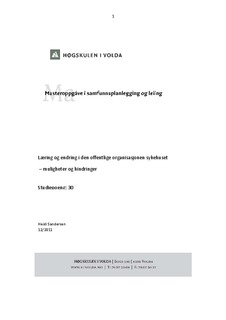| dc.description.abstract | Abstract
Purpose: The study aims to gain deeper knowledge about how planning- and reporting systems affect new learning and change in hospitals on a sectional level and how the leaders function can contribute in promoting new learning and change.
Method: A qualitative research interview with an interview guide was used to ensure that the 10 persons interviewed responded to the issues in question. Additionally the semi structured interview allowed them to speak freely about what occupied them regarding these issues.
The persons interviewed were all leaders on a sectional level in the Department of Women and Children in Oslo University Hospital (OUS). Their professional backgrounds were either nurse or doctor. They all have budget responsibility. The answers were compressed and an extract of the answers is presented within three areas.
Results and conclusion: Analysis of the interviews revealed three main patterns:
The strategic plans contribute little in new learning and change on a sectional level because most of the leaders experienced that they have not participated in important communicative processes in strategic planning. Frames from levels above often limited the decisions or the time to discuss was to scarce. In tactic and operative planning on organizing and carrying out annual plans, the room of action was experienced as small with few possible choices.
The leaders experienced reporting of various data as generally useful. However the reports in question comprise measurable data only, due to the model of management of hospitals in Norway which focuses on an economic-technical thinking. The data are fragmented, and therefore do not contribute to new learning. When reporting on qualitative data, they were given little response, interpreted as low importance.
The merge process in the department may not have allowed vital discussions to happen on the sectional level. Management in the hospital by strategy E (economy) has been focused, while other models as strategy O (organization), the workshop model and the model of professions where focus on mobilization and negotiation, are equally important.
Future roadmap: Real communicative processes on strategic plans will enhance learning and legitimate change and ensure progress and direction of the change process. Reports on both quantitative and qualitative data deserve equally attention, to evaluate what the sectional leaders account for and to increase learning and change. The leader function must facilitate use of different models of management, depending on the issue to resolve.
Key words: Learning, change, planning, reporting, leader function, hospital, organization. | no_NO |
